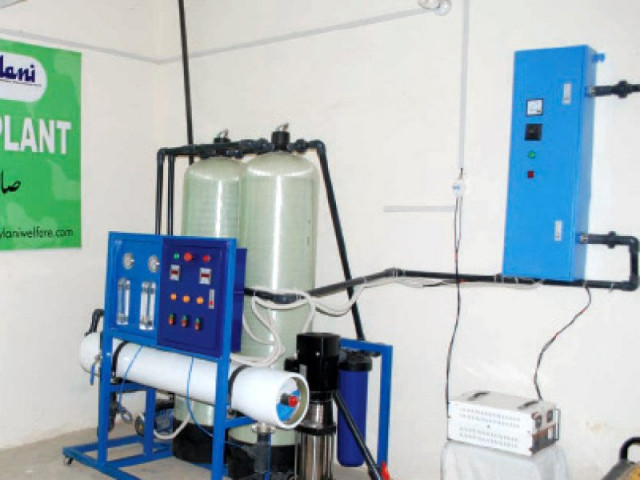For clean drinking water: Saylani Welfare plans to install 63 RO plants in the city
First plant already set up in Siddiq Goth near Shah Faisal Colony

Saylani Welfare has set up the first of the 63 reverse-osmosis plants in Siddiq Goth near Shah Faisal Colony. PHOTO: COURTESY SAYLANI INTERNATIONAL WELFARE TRUST
Saylani International Welfare Trust, which is known for providing free food to the homeless, has joined hands with the commissioner's office to set up these RO plants. "We have already installed the first RO plant at Siddiq Goth near Shah Faisal Colony," said Saylani's project director Muhammad Ghazzal. "This plant has a capacity to purify 5,000 gallons of water per day."

The head of the planning and development department at the commissioner’s office, Syed Muhammad Shakaib, told The Express Tribune that they had asked the trust to set up one plant as a model before they signed a memorandum of understanding. "Once we were sure of their sincerity, we signed an agreement to help install 63 RO plants in the city," he said.
The Siddiq Goth plant started working last Friday, said Ghazzal, adding that it has started providing clean water to 0.2 million people. These 63 RO plants, which will be installed around the city, will provide free potable water to nearby residents, he added.
The charity is planning to build the next one in Jacob Lines but have yet to decide the remaining locations. The team visits various parts of the city to see where there is a dire shortage of clean drinking water. Once the site is identified, it takes them 60 days to build the plant, install it and commission the unit, explained the project director.
He said that all the relevant land-owning agencies have agreed to provide land on a case-to-case basis. The commissioner’s office also confirmed that they will give government land for these plants.
All the expenses incurred in building and maintaining the plant, such as paying utility bills and providing security to the facility will be borne by Saylani Welfare, added Ghazzal. "Installing the plant is not a difficult task but maintaining it is," he said. "We will bear it with the help of other donor organisations."
Shakaib explained that these plants will not use water from Karachi Water and Sewerage Board's main trunk line. "They will use underground water and turn it into potable water," he said. He admitted that waterborne diseases are a menace in Karachi as people in low-income settlements are unable to buy mineral water and end up drinking directly from the tap. "The government is sincere in providing clean drinking water across the city," he added.
Pakistan Paediatric Association president Dr Iqbal A Memon appreciated the project but insisted that providing clean drinking water is the responsibility of the government. "Waterborne diseases easily affect children, especially those from low-income groups as they are already malnourished," he said, hoping that all the plants are installed as soon as possible.
Published in The Express Tribune, January 21st, 2015.



















COMMENTS
Comments are moderated and generally will be posted if they are on-topic and not abusive.
For more information, please see our Comments FAQ